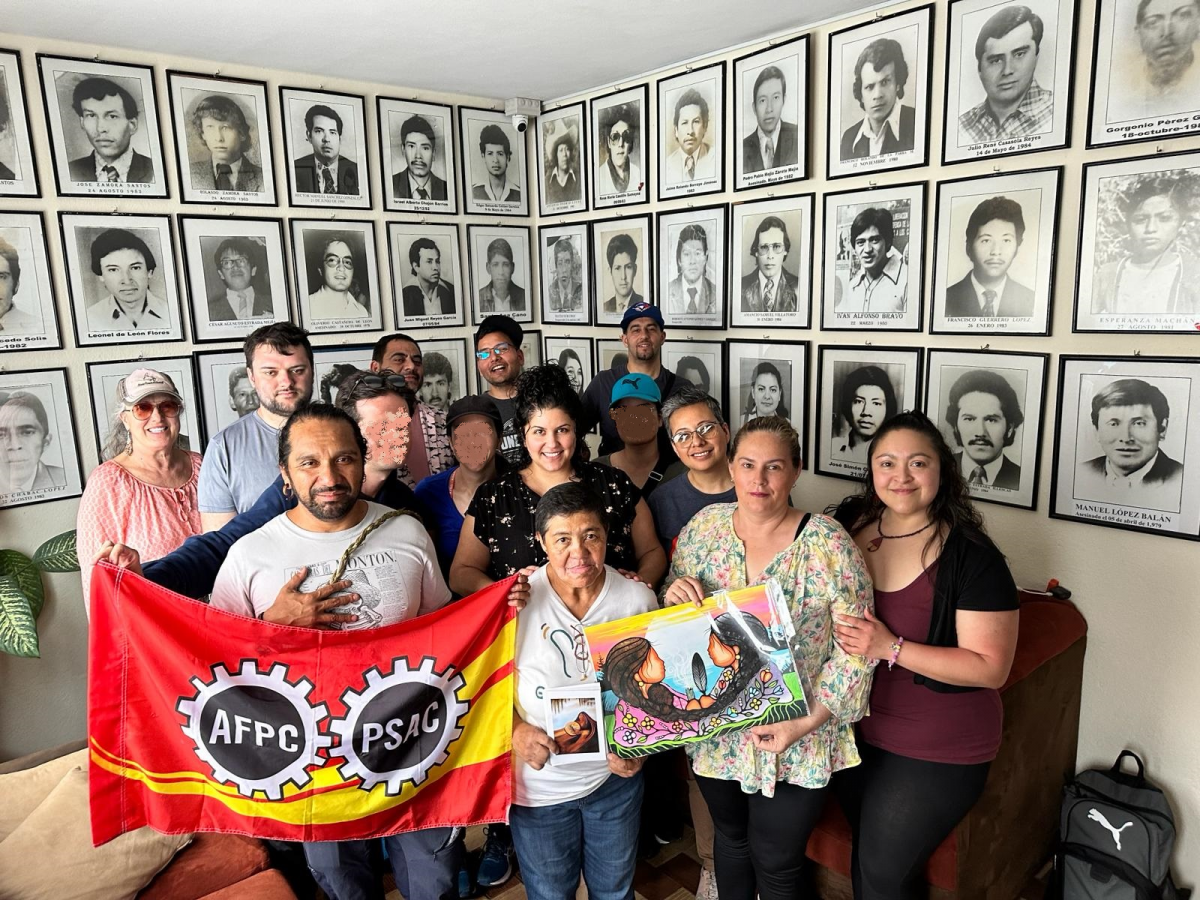Healing through justice: the ongoing work of FAMDEGUA in Guatemala
By Carlos Gardella
In March 2024, I learned more about respect following my participation in the PSAC Education in Action Program in Guatemala.

Despite the material conditions of poverty afflicting the population, I enjoyed living among the beautiful and kind people of Guatemala’s highlands. We were nurtured by different people and community organizations where we learned about their challenges, and we recognized and learned of their abilities, skills, and courage to survive and to overcome their difficulties. I reaffirmed and learned important things, and they treated me with respect, kindness, and affection.
However, spreading across the world is a climate of confrontation and polarization that threatens to erode respect, and its consequences would be disastrous.
That’s what happened in Latin America during the Cold War when numerous civilian military dictatorships committed human rights violations and crimes against humanity with consequences that Guatemalan families are still dealing with today.
One of the organizations we visited in Guatemala City, FAMDEGUA, which means the Association of Relatives of the Detained and Disappeared of Guatemala, assists families who are looking for their loved ones.
FAMDEGUA was founded by the relatives of people who disappeared in Guatemala during the Guatemalan Civil War (1960-1996). Since 1992 until today, it has worked for the preservation of historical memory and justice. Their work includes searching for people who were victims of forced disappearance, denouncing the violation of fundamental human rights and freedoms, promoting exhumation and burials, accompanying litigation processes together with the victims' relatives, and raising awareness about these experiences with other family members.
In Guatemala City, FAMDEGUA has transformed a house into an office, filled with photographs of loved ones. Visting the office, I was surrounded by faces of fathers, mothers, husbands, wives, sons, daughters, brothers, and sisters who were tortured, murdered, and disappeared.
It was a very emotional moment for me, remembering the times in Chile when we survived under the tyranny of a civilian military dictatorship who carried out the same kinds of atrocities, separating families forever and hiding the bodies of the deceased loved ones. Even now, the opportunity to live in peace is denied to thousands of families that cannot find their loved ones. Opening a wound that cannot heal without truth and justice.
To be separated by force from a loved one is extremely painful because this separation is not due to natural causes, it is arbitrary. Every one of us feels deep sorrow when a person we love passes away and the opportunity to talk, to hug them again and tell them how much we love them and how much we need them is stolen from us.
How we hope that death will not touch our loved ones so we can hug them forever. Unfortunately, that is not possible, but at least, most of us have the chance to know where their bodies are resting, maybe visit them in the cemetery, wish them to rest in peace, giving us the opportunity to continue living in peace with their legacy and love.
Can you imagine how you would feel if you cannot find the body of your loved one? This pain is without end. There is an empty place or no place at all, where you can put their bodies to rest in peace, there is no place where you can bring your flowers and attempt a conversation from your heart or the imaginary and express your affection and love. This kind of relief, this consolation is stolen, kidnapped, and hidden by cruelty.
An excerpt from the United Nations Human Rights Office of the High Commissioner website reads, “A fundamental right of families [is] to know what happened to their loved one, disappeared or deceased. And related to this is the right to the truth, to know specifically what happened and linked to this, the right to justice, to life, and to reparation.”
Despite difficulties and threats, FAMDEGUA has worked on exhumations and gathering testimonies, condemning the State of Guatemala, and obliging it to carry out the necessary investigations and judicial processes against those responsible for these crimes. With the support of other organizations, including PSAC’s Social Justice Fund, they have played a key role in demanding that the State of Guatemala investigate these cases and locate the more than 45,000 people who had been detained-disappeared.
PSAC and the broader labour movement must continue to affirm and support the struggles for human rights that are happening today. Together, we can build a society of respect, truth, and justice that unequivocally supports the principles of human rights as outlined in the Universal Declaration of Human Rights, the Canadian Charter of Rights and Freedoms, and the Canadian Human Rights Act. In times of socio-political polarization, these are essential anchors for our society that guide our efforts to build a better Canada for everyone.
As union members, there are many things we can learn from FAMDEGUA’s experience. They are a good example of organizing, courage, and perseverance to continue fighting for truth and justice. FAMDEGUA is also an example of resilience and hope. Despite tough conditions, death threats, death and sorrow, they continue ahead.
Maybe in the end, families are forever, and people only truly die when they are forgotten.
Carlos Gardella is the chief shop steward for UNDE Local 30910 in Medicine Hat, Alberta. He is also the Chair of PSAC’s Human Rights Committee in Calgary and Southern Alberta.
 Member Login
Member Login


